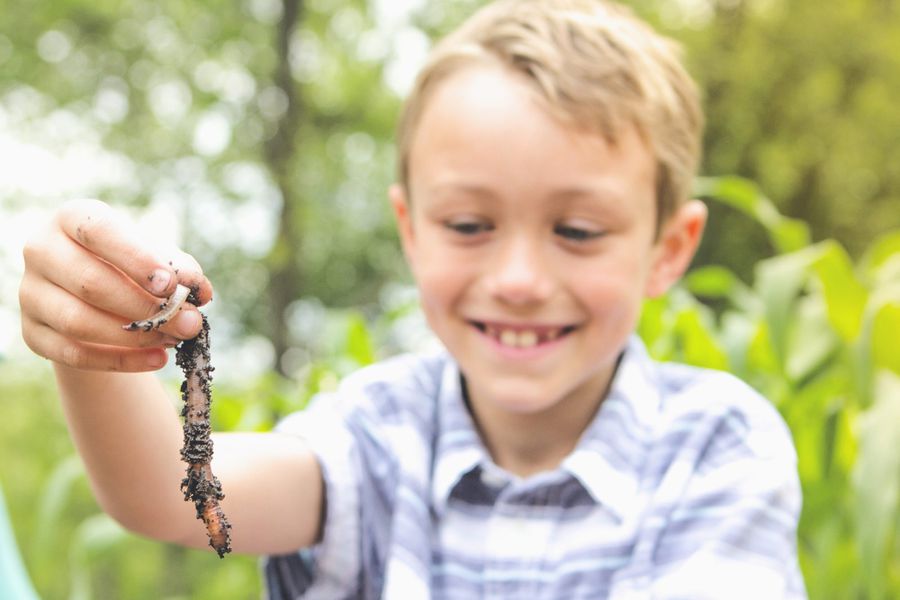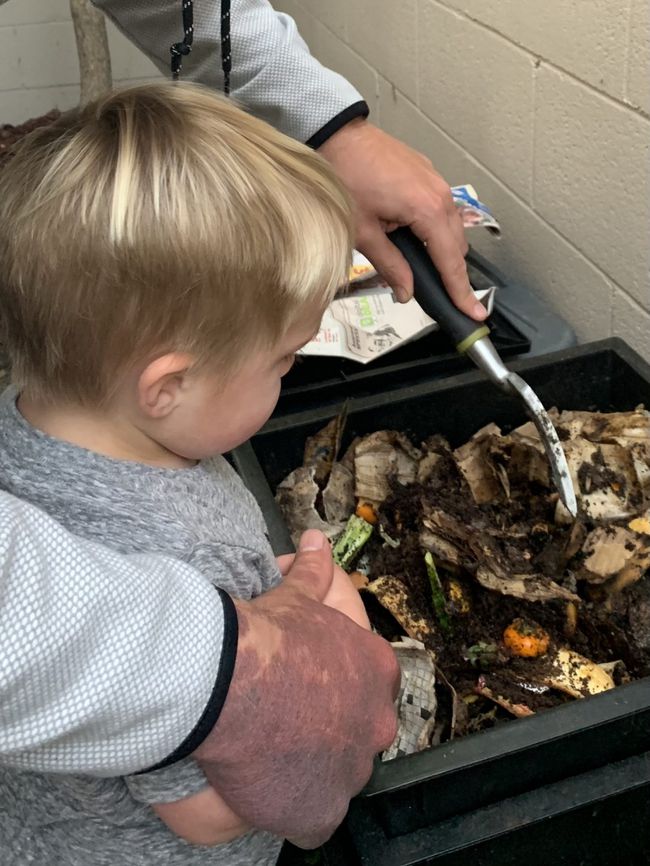
My family and I got our worm farm after moving into a teeny apartment in Long Beach, California. We didn't have a yard or garden, but wanted a solution to help us get rid of our food waste, something my husband and I both grew up doing. Spending his early days on a Kentucky farm, my husband owned very hungry pigs who enjoyed any peel or core they could get their snouts on. I, living in England, used a traditional compost pile in our garden.
But when we moved into our Californian shoe-box flat, there was no garden, and certainly no pigs, in sight. After a few Google searches, we settled on a worm farm. Worms are low maintenance, don't require a large outdoor space, and can compost half their weight in food scraps a day. They're also amazingly educational for kids.
According to Isaias Hernandez, an environmental educator and creator of the popular Instagram account @queerbrownvegan, worm farms, or composting in general, “allow children to learn about soil health, independence, and understanding of how natural-based systems operate.”
My toddler backs up this theory. He loves to be included in gathering up our veggies for feeding time, and can’t wait to grab his shovel and help remove their castings (nutrient-rich soil worms leave behind) to sprinkle on our plants. Ultimately, Hernadez says, this exposure “can help lessen the impact of food that is being thrown away.” Considering nearly one-third of food produced globally is thrown out every year, I’d say that’s kind of a big deal.
That's not the only benefit of inviting hundreds of wiggly friends into your home, though. Here are a few more, along with advice on starting your own worm farm.
Cuts Your Family's Waste Down Dramatically
Household waste basically consists of three groups: recyclables, compostables, and landfill. In most communities recycling and trash collection are very accessible, but there are limited programs to help with food scraps. As "most food waste in the United States is generated in our own kitchens," this is an issue Hernandez says.
Adding a worm farm is an easy method to make a huge difference. Since our family started, we only produce one trash bag a week. Our recycling goes to the city, and our worms take care of the rest. Less trash also means fewer arguments about who's going to take the can out on garbage day! Bonus!
Helps Kids Care About the Environment
Organic matter (like carrot peels, apple cores, and strawberry tops) thrown out with the rest of your rubbish can actually contribute to global warming. Instead of breaking down naturally, food scraps get compressed in landfills and begin to rot. This produces methane gas that escapes into our air, and a toxic liquid called leachate that can leak into our groundwater.
Worm farms have the opposite effect. They reduce methane emissions and produce an amazing fertilizer for your garden. According to Hernandez, introducing your kids to worm farms also has the potential to make them "better stewards of the environment," and can even lead to improving their focus and stress levels if your worm farm, or compost heap, is outside in a green space.
Our son is just shy of 2-and-a-half, but since getting our worm farm he's taken on the role of our neighborhood's trash police. Helping us clean up from meals by throwing our scraps into the kitchen compost collector eventually graduated into noticing pieces of trash (or "tash," as he says) on our walks, and he insists on placing everything he finds in the bin.
Although it definitely requires having the baby wipes and hand sanitizer on quick draw, it's something I hope he brings with him as his body, and understanding of the environment, grows.

Keeps Kids Entertained
Aside from being hard workers for the environment, worms are simply mega interesting to kids. They squirm, they wriggle, and they're also hard to break, so your little one can handle them if they want to have a closer look. Checking on the worms can become an activity all in itself—akin to walking the dog—and leads to other fun games like slithering and wiggling like a worm, and looking for worms when you're at the park.
As your kids get older, you can use them to teach larger lessons about ecosystems and farming. The Commission for Environmental Cooperation (CEC) has great ideas for activities and actions to inspire future eco-warriors.
How to Start Your Own Worm Farm
If you've been successfully convinced to grow your family by a couple hundred worms, there are a few different ways you can go about it.
Start with your city
Some cities have programs as part of their recycling department offering composting bins and worm farms at a reduced rate. They may even pick up your food scraps for you. If your city doesn't (a simple search on your local government website should answer this), "try looking into farmer's markets, neighborhood co-ops, or community gardens near your area," says Hernandez.
Make your own
Making a worm farm is easy! All you need is a tub, newspaper, food scraps, and worms. You can reuse any plastic or wood tub you may already have, or pick up a 5-Gallon Bucket from your local hardware store. Prepare the bedding by mixing moist, torn, newspaper and your food scraps, then add worms. The best type to use, because of their hunger levels, are red worms. Local garden centers may have worms for sale, or you can buy online.
When it's time to remove your worm castings, a sieve does the trick very quickly.
Buy one
If doing it yourself is not your jam, you can purchase a variety of different pre-made options. We opted for the Worm Factory 360 Composter that features multiple different trays to rotate as your worms produce castings, but there are also super cute options that can live inside. The Worm Farm Composter from Gardener’s Supply comes in vibrant green of chic grey and would brighten up any kitchen or utility room.
Whether you buy or make, be sure to keep your food scrap to newspaper ratio 50/50 so the worm's don't become too moist or too full, avoid dairy and meats, and always leave air holes if covered.
